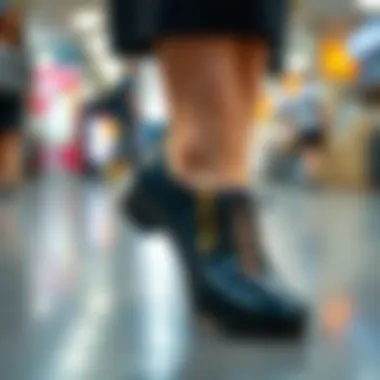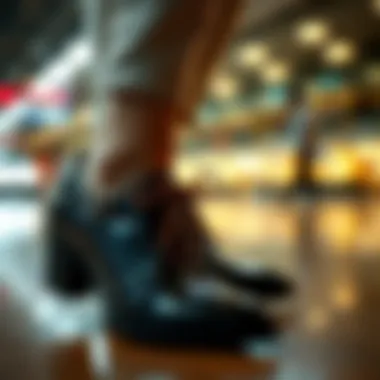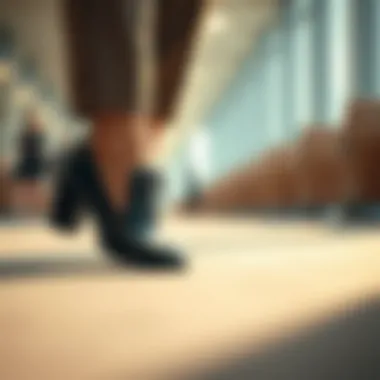Essential Guide to Choosing Work Shoes for Pregnant Women


Intro
Choosing the right work shoes during pregnancy is a vital yet often overlooked aspect of expecting mothers’ routines. As their bodies undergo significant transformations, the footwear they wear can have profound implications for their comfort, health, and overall well-being. Disregarding the essentials of proper shoe selection can lead to unnecessary discomfort or even long-term issues. This guide aims to demystify the process of selecting work shoes for pregnant women, addressing factors such as comfort, support, materials, and style—key elements that directly influence daily activities.
With the surge of growing awareness around maternal health, professionals and retailers alike are stepping up to provide supportive options tailored to this unique population. Whether working long hours or managing busy home life, the right shoes can make all the difference in maintaining one’s quality of life.
Let’s dive into the nuances of selecting the best footwear for comfort and safety during one of life's most transformative chapters.
Fabric Knowledge
Understanding the material composition of work shoes is paramount. Different fabrics not only affect aesthetics but also impact support, breathability, and overall comfort levels. Pregnant women might find themselves more sensitive to discomfort, making knowledge of fabrics critically important.
Types of Fabrics
- Leather: Known for durability and natural breathability. Leather shoes can mold to the shape of the foot, offering a more customized fit.
- Canvas: Lightweight and breathable. This fabric allows for good airflow, making it a comfortable option for warm environments.
- Synthetic Materials: Often used for athletic shoes, these fabrics tend to provide moisture-wicking properties, keeping feet dry and comfortable.
- Cotton: Soft and gentle against the skin. Cotton-lined shoes can prevent irritation and are suitable for women with sensitive skin.
- Mesh: Excellent for ventilation. Often seen in sneakers, mesh panels can help regulate temperature and reduce sweat build-up.
Choosing the right fabric can truly enhance comfort. For instance, opting for shoes with moisture-wicking synthetic linings might be beneficial for women experiencing increased perspiration due to hormonal changes.
How to Care for Different Fabrics
Taking care of shoe materials ensures their longevity and performance. Here are a few tips based on popular fabrics:
- Leather: Clean with a damp cloth. Use conditioner to maintain suppleness. Avoid soaking it in water.
- Canvas: Machine wash on a gentle cycle. Air dry away from direct sunlight to avoid fading.
- Synthetic Materials: Wipe down with a damp cloth and mild detergent if necessary. Avoid harsh chemical cleaners to preserve flexibility.
- Cotton: Spot clean with a mild detergent. Regular washing may lead to fraying, so minimize frequent washes.
- Mesh: Rinse with water and let air dry. Do not use a dryer as it can damage the structure.
"Proper care can extend the life of your footwear, letting you keep your feet comfy and stylish through every stage of ваш pregnancy."
Understanding the Importance of Support
While fabrics lay a groundwork for comfort, the support they provide is equally paramount. Flat feet, changes in posture, and weight fluctuation can add strain to arches and heels. Shoes with arch support and cushioned insoles can mitigate a variety of discomforts, allowing expectant mothers to stay active and engaged.
Visibility to detail such as heel height should not be neglected as well; a lower heel can prevent unnecessary strain on the back, ensuring balanced posture while on the job.
In summary, selecting the right work shoes for pregnant women requires a thoughtful approach, focusing on fabric choices, supportive features, and proper care techniques. In the next sections, we will discuss style considerations and how to blend function with fashion seamlessly for a variety of professional settings.
Prologue to Work Shoes for Pregnant Women
When it comes to the journey of pregnancy, comfort is paramount, especially during long work hours. Pregnant women undergo numerous physical changes that can significantly heighten the need for appropriate work footwear. Choosing the right shoes isn't merely about aesthetics; it’s about ensuring support, stability, and overall well-being. The work environment can often demand hours of standing or walking, which may pose challenges with the right footwear.
Pregnant women may experience increased fatigue and discomfort, exacerbated by ill-fitting shoes that lack necessary support. This guide aims to shed light on the various aspects of work shoes that are specially designed to cater to the unique needs of expectant mothers. By focusing on the importance of appropriate footwear, we underscore the significant benefits of investing time and effort into making informed choices about shoe selection.
Understanding the Need for Proper Footwear
Proper footwear serves a dual role for pregnant women. It not only promotes physical comfort but also plays a crucial part in managing health. As the body changes, the demands placed on the feet evolve as well. Therefore, understanding these requirements can lead to a more productive and enjoyable work experience.
Here are several reasons why selecting the right work shoes is essential during pregnancy:
- Support and Stability: Shoes that provide ample support can alleviate stress on the joints and help maintain balance. As the center of gravity shifts, proper alignment becomes increasingly important.
- Cushioning: Adequate cushioning can help reduce pressure on the feet. This is particularly crucial as weight gain progresses throughout the pregnancy.
- Injury Prevention: The wrong footwear can increase the risk of injuries. A slip or fall due to poor grip or ill-fitting shoes can have serious implications for both mother and baby.
"Investing in the right shoes during pregnancy not only supports physical health but can enhance emotional well-being too. Feeling comfortable in one's own skin makes all the difference."
Choosing suitable work shoes requires thoughtful consideration. It’s about balancing fashion with function, prioritizing comfort while maintaining professional appearance. By examining the physiological changes that take place during pregnancy, we can better understand how to meet the specific requirements of this demanding, yet rewarding time in a woman’s life. As we navigate through the rest of this guide, we will explore features and types of shoes designed for pregnant women, ensuring comfort and support remain at the forefront.
Physiological Changes During Pregnancy
The journey through pregnancy is not just a time of joy; it also wreaks havoc on a woman's body, leading to several physiological changes that demand attention, especially when it comes to selecting the right work shoes. Understanding these changes is pivotal because they play a critical role in ensuring comfort and reducing the risk of injuries while navigating the workplace. Pregnant women often face unique challenges that make it all the more essential to be mindful about their footwear choices.
Weight Gain and Its Impact on Feet
Weight gain during pregnancy is a given, and it often contributes to the stretching of the ligaments and muscles in the feet. As the baby's weight increases, the pressure on the feet heightens. Here are some key points to consider:
- Increased Foot Size: Studies indicate that many women notice their shoe size increasing during pregnancy. This can lead to discomfort if shoes are not properly fitted.
- Arch Pain: Extra weight can put added stress on the arches, leading to pain that can radiate through the entire foot.
- Swelling: Fluid retention is common, particularly in the later stages of pregnancy. If the shoes are too tight, it can exacerbate this discomfort.
It’s advisable to seek shoes that accommodate this fluctuation. Comfort and adequate fit become crucial, and arch support is a must.
Hormonal Changes Affecting Ligaments
The hormonal landscape during pregnancy shifts dramatically, primarily due to the increase in relaxin, a hormone that helps the body adapt for childbirth. This hormone not only loosens ligaments in the pelvis but also affects those in the feet, creating a sense of instability. Consider the following points:
- Increased Flexibility: While this flexibility is essential for labor, it can lead to an increased risk of injuries, such as ankle sprains, if proper support isn’t offered by the footwear.
- Wobbliness: Many women report feeling less stable on their feet, making supportive, non-slip shoes a priority.
- Need for Custom Insoles: As the body adjusts to these changes, custom gel insoles or arch supports may become necessary to ensure each step is secure and stable.
Changes in Foot Shape and Arch Support
As pregnancy progresses, women may notice changes in the shape of their feet, including the lengthening and widening of the foot. This alteration often requires a reassessment of footwear choices.
- Flatter Arches: Many women experience a decrease in the arch height, which can lead to overpronation — when the foot rolls inward excessively. Good arch support is vital here to counterbalance this effect.
- Launch into Buying New Shoes: Women should spend time evaluating their shoe collection. It might be time to let go of those favorite pairs that no longer fit.
- Wide Options: Look for brands that offer wide-fit options to accommodate any swelling or foot expansion that might occur as the due date approaches.


Choosing the right shoes during pregnancy not only helps in comfort but also improves the overall health of the feet and body. It is a simple yet critical consideration in maintaining workplace efficiency and quality of life during this unique period. Remember, your feet are your foundation — treat them well!
Essential Features of Work Shoes
Selecting the right work shoes for pregnant women is more than just a matter of style. Comfort and support, often overlooked, become paramount as they directly influence overall health and well-being during this critical period. Each anatomical change requires careful consideration, with various features playing significant roles in providing that needed assistance.
When exploring essential features, three stand out among the rest: cushioning and shock absorption, arch support and stability, and breathability along with moisture control. Understanding each of these will guide women towards making informed decisions that will keep them comfortable while navigating their work environments.
Cushioning and Shock Absorption
Cushioning acts like a soft cloud beneath your feet, absorbing shock and minimizing impact. This feature is crucial for pregnant women, who often deal with increased weight and pressure on the feet. Shoes with superior cushioning will help reduce the jarring sensation that occurs with each step, leading to less foot fatigue and discomfort.
When selecting shoes, look for materials like gel, foam, or specialized pods that provide this cushioning effect. It’s important to note that not all cushioning is the same. For instance, orthotic inserts can enhance the level of comfort significantly. These can be customized to fit personal needs, and they add an extra layer of relief that can be a game-changer for working pregnant women.
"The right shoes can be the difference between having an exhausting day on your feet and a manageable one."
Arch Support and Stability
As pregnancy progresses, changes in foot shape can mean that good arch support becomes more than a luxury; it’s a necessity. Arch support not only aids in distributing weight evenly but also contributes to overall stability. Shoes lacking proper arch support can lead to various issues like plantar fasciitis or simply discomfort that can affect productivity.
Opt for shoes featuring built-in arch supports or consider those accommodating custom orthotics. The stability of a shoe is equally essential; shoes should not wobble or lack structure as this can lead to mishaps. Look for options that offer a wider base for better balance while ensuring flexibility to support natural foot movement.
Breathability and Moisture Control
Breathability! That’s one word that sums up a significant necessity for work shoes. Expectant mothers often experience increased perspiration, making shoes that allow for airflow essential. Materials like mesh or specially designed moisture-wicking fabrics help keep feet dry and comfortable, preventing unpleasant odors and potential skin irritations.
In addition to breathability, moisture control mechanisms are pivotal. This is particularly vital in work environments where long hours are spent standing or on the move. Shoes incorporating ventilation and moisture control will have a significant influence on maintaining foot health throughout the day.
These essential features—cushioning, arch support, and breathability—when taken into account, not only enhance comfort but also ensure pregnant women can sustain productivity in their respective workplaces. Remember, the right pair of shoes doesn’t just support the body; they bolster confidence as well, allowing women to focus on their work without the distraction of discomfort.
Types of Work Shoes Suitable for Pregnant Women
Selecting the right work shoes during pregnancy goes beyond mere aesthetics. It's about finding a balance between comfort, support, and style. The nature of pregnancy alters foot structure and demands shoes that offer the right kind of accommodation—this makes understanding the types of work shoes crucial. Each category of shoes presents unique benefits that fit different work environments and personal preferences. Let’s delve into some suitable types of work shoes that can help expecting mothers maintain their stride without sacrificing comfort.
Flats and Loafers
Flats and loafers often tend to get overlooked in the realm of pregnancy footwear, yet they can serve as a stylish yet highly functional choice. With their flat soles, these shoes provide stable ground while minimizing arch strain.
- Flexibility and Adaptability: Suitable for various office settings, flats can easily transition from casual to formal wear.
- Foot Room: Many flats come with an elasticized opening or a looser fit, allowing for swelling that often accompanies pregnancy, which is a no-brainer for comfort.
- Fashion Versatility: Available in numerous colors and styles, they can match nearly any outfit, which is appealing when maintaining a professional appearance.
Despite their advantages, it's wise to select flats that prioritize cushioning and avoid flimsy soles, as this can lead to discomfort during longer hours.
Sneakers and Athletic Shoes
Sneakers and athletic shoes are an unequivocal favorite for many pregnant women. These shoes encapsulate a blend of comfort and support that most other types lack. Here are key reasons why they stand out:
- Good Cushioning: Sneakers typically feature superior cushioning technology, which absorbs shock and lessens strain on feet and lower back.
- Breathable Materials: Often constructed with breathable mesh and moisture-wicking fabrics, they keep your feet dry even during long hours on your feet.
- Arch Support: Most athletic shoes come with built-in arch support which is vital for countering the added weight pregnant women carry.
Choosing sneakers with a wide toe box is particularly valuable, accommodating foot swelling and preventing discomfort. Brands such as Nike and Asics offer excellent choices designed for both performance and style.
Slip-ons and Mules
Slip-ons and mules, with their easy entry and exit design, are a wonderful option especially during the later stages of pregnancy when bending down may feel like an Olympic event. Here’s why these shoes deserve a spot in your wardrobe:
- Convenience: Easily slip on and off, they make trips out less of a hassle, especially for those rushing out the door.
- Comfort Fit: Many modern mules come with cushioned insole and soft upper materials, catering to the changing shape of a pregnant woman’s feet.
- Stylish Appeal: Mules can be found in a myriad of styles, from casual to business-professional, making them suitable for any work environment.
While choosing mules, ensure your selection provides a good grip on the sole to prevent slips, which could be hazardous during pregnancy.
Supportive Sandals
Supportive sandals often get a bad rap for being overly casual. However, several options on the market combine comfort with practical support, making them suitable for work. Consider the following attributes:
- Adjustability: Many sandals come with adjustable straps which can cater to swollen feet, ensuring a snug yet comfortable fit throughout the day.
- Durability: Look for sandals made with robust materials that can withstand regular wear without falling apart.
- Designed Features: Opt for sandals that feature built-in arch support and cushioning to ease the pressure on your feet, especially in hot weather, when feet can swell up.
When choosing sandals, brands like Teva and Birkenstock offer supportive options tailored for expectant mothers.
Always remember, the right shoes can physically and mentally influence your work day, especially during pregnancy. Prioritize footwear that truly caters to your needs, so you can focus on what really matters.
Considerations for Work Environments
Choosing the right work shoes for pregnant women goes beyond simply picking a stylish or trendy pair. The work environment significantly influences footwear choice, as different settings pose diverse challenges and requirements. When expecting, comfort and support should always be front and center, but they may manifest distinctly depending on the job's nature. Each type of work environment presents unique factors to consider, leading to diverse footwear solutions that prioritize health and safety without sacrificing comfort.
Office Settings
In an office environment, the atmosphere is often more controlled, but that does not diminish the need for proper footwear. Many women find themselves seated or mainly in a limited space, yet the strain from prolonged sitting can cause swelling and discomfort in the feet. Thus, choosing shoes with adequate cushioning is crucial.
Here are a few points to keep in mind regarding office shoes for pregnant women:


- Arch Support: Shoes should have sufficient arch support to prevent any discomfort caused by an arched foot. Several brands are known for their orthopedic features designed specifically for pregnant women.
- Slip-resistant Soles: Even in an office, there can be slip hazards. Opt for shoes with good grip and slip-resistance.
- Easy Adjustability: Pregnancy can come with fluctuating foot sizes. Shoes that can easily adjust, such as those with elastic bands or adjustable straps, are ideal to cater to swelling feet.
With these considerations, a comfortable pair of loafers or cushioned flats can do wonders in balancing professionalism with comfort.
Retail and Hospitality Industries
In dynamic settings like retail or hospitality, where standing for long periods is the norm, the right footwear plays a pivotal role in a professional's daily comfort and efficiency. These industries require shoes that not only provide comfort but also withstand the rigors of daily activities.
Some aspects to think about include:
- Durability and Support: Given the on-your-feet nature of the job, it’s essential to select shoes built for continuous wear. Sneakers or supportive sandals with shock-absorbing features could be great choices.
- Breathability: It's no secret that feet can get sweaty during long shifts. Focusing on shoes made from breathable materials helps in managing moisture and comfort.
- Stylish Appearance: Retail positions often require a polished look. Considering this, many brands offer stylish yet functional options that cater to aesthetic requirements as well as comfort needs.
Healthcare and Service-oriented Roles
A healthcare setting is often marked by a fast-paced environment, where professionals can spend the entire shift on their feet. Consequently, shoes in this field must prioritize safety, hygiene, and utmost comfort.
Some critical elements to consider in healthcare include:
- Slip-resistant Features: Since these environments can often be slick with spills, shoes with slip-resistant technology are vital to prevent falls.
- Easy to Clean: Healthcare professionals frequently encounter spills or contaminants. Choosing footwear that can be cleaned easily or is water-resistant helps maintain hygiene.
- Cushioning and Flexibility: The shoe should provide ample cushioning—an essential factor when standing for hours. Also, flexibility allows for a natural range of motion, promoting overall foot health.
Material and Design Considerations
When it comes to choosing the right work shoes for pregnant women, material and design play a pivotal role. The right choices not only affect comfort but also contribute to overall foot health. Pregnancy brings about various physical changes, making it crucial to prioritize features that can accommodate these shifts while ensuring both safety and style.
Synthetic vs. Natural Materials
When selecting work shoes, one finds oneself caught in a bit of a debate between synthetic and natural materials. Each comes with its unique set of pluses that cater to different needs. Synthetic materials, like mesh or synthetic leather, are often lighter and can allow for better breathability—vital for pregnant women who may experience increased foot swelling and perspiration. Furthermore, synthetic options are generally easier to clean, helping to keep the shoes looking fresh longer.
On the flip side, natural materials such as leather are renowned for their durability and comfort. They often conform better to the shape of the foot over time, providing a snug yet forgiving fit. Another appealing characteristic of leather is its inherent ability to withstand wear and tear, making it a solid choice for daily use. However, it’s crucial to ensure that natural materials come from reputable sources to avoid any harmful chemicals that could affect both the mother and the baby.
"The choice of material is not merely aesthetic; it’s about comfort, adaptability, and maintaining the health of both mother and child."
Water Resistance and Durability
Durability can’t be stressed enough, particularly when work environments call for shoes that can withstand the test of time. For pregnant women, water resistance becomes another key aspect worth considering. Shoes that can repel moisture are particularly beneficial—especially if there’s a risk of spills or if working in outdoor settings. Not only do water-resistant shoes help keep feet dry, but they can also mitigate the risk of slipping, reducing the chances of accidental falls during this critical period.
It’s also worth noting that a shoe’s construction contributes significantly to its durability. Look for reinforced stitching and high-quality soles that can bear the daily grind without compromising on comfort or safety. Remember, when the unexpected happens, you want shoes that have your back, or rather, your feet.
In summary, material and design considerations significantly influence the selection of work shoes for pregnant women. Weighing the benefits of synthetic versus natural materials can guide you towards the best choice, while keeping durability and water resistance in mind ensures a shoe that not just looks good but performs brilliantly—even in challenging conditions.
Recommending Comfortable Brands
When it comes to selecting work shoes for pregnant women, choosing brands that prioritize comfort is key. The right footwear not only provides support but also plays a significant role in overall well-being. With various physiological changes during pregnancy, well-designed shoes can alleviate potential discomfort and promote a healthier stance and gait.
Comfortable brands can also enhance confidence. A well-fitting shoe doesn't just look good; it feels good too. Investing time in researching brands can yield dividends in comfort and satisfaction, particularly for mothers-to-be navigating both work and the physical challenges of pregnancy. Moreover, reputable brands often incorporate advanced technologies into their designs, offering features that protect against fatigue and discomfort throughout the day.
An important consideration is that with numerous options available, the right choice depends on individual needs, such as foot type, work environment, and personal style. Thus, branding matters.
"Quality footwear is not merely about style but primarily about sustaining health during one of the most transformative times in life."
Well-Known Brands for Pregnant Women
Familiar names in the footwear industry often stand out for a reason. Brands like Clarks, Skechers, and Birkenstock have made a name for themselves by offering styles that marry comfort with wearability. For instance, Clarks is renowned for its cushioned insoles and supportive heel structures, which can be a game-changer for expectant mothers experiencing foot discomfort.
- Clarks: Known for their arch support and cushioning, Clarks often has a variety of styles suited for different work settings.
- Skechers: This brand particularly shines with their memory foam technology which adapts to the foot shape, providing optimal coziness.
- Birkenstock: Famous for cork footbeds that mold to the feet, Birkenstock’s sandals offer excellent support and breathability, a necessity in warm work environments.
These brands not only cater to pregnant women but also receive high marks from healthcare professionals for their attention to comfort.
Emerging Brands Focusing on Comfort
While recognizable names have their advantages, emerging brands are shaking things up in the comfortable footwear realm. Brands like Rothy’s and Allbirds are gaining traction by marrying eco-friendliness with comfort.
- Rothy’s: This brand centers around sustainability with shoes made from recycled materials. Their flats offer a flexible fit, and while stylish, they provide ample support for daily wear.
- Allbirds: Known for their wool runners, Allbirds provide excellent breathability while being incredibly soft. Their shoes cater to the environment and prioritize comfort, drawing praise not just from pregnant women but from anyone seeking long-lasting wear.
These newer brands emphasize that comfortable shoes can be both aesthetically pleasing and functional, helping to demonstrate that style does not have to be sacrificed for comfort.
Choosing the right shoes is paramount; whether opting for established names or exploring new ones, pregnant women can find supportive footwear that keeps them feeling good at work.
Consulting Healthcare Professionals
When navigating the sometimes overwhelming world of pregnancy, one of the wisest steps a woman can take is to consult healthcare professionals about footwear choices. The importance of this cannot be overstated. Since pregnancy involves significant physiological changes, the guidance of experts like podiatrists and physical therapists is invaluable. They not only understand the intricacies of foot health but also can tailor their advice to suit the unique needs of each pregnant woman.
Having a conversation with a healthcare provider can pave the way for targeted recommendations that go beyond general advice. For example, they might suggest specific types of shoes that offer much-needed support based on the individual’s foot structure and any discomforts she may be experiencing. Additionally, such professionals can help identify any pre-existing conditions that may necessitate specialized footwear.
Consulting with experts ensures that the recommendations made are based on medical insights, thus enhancing the overall comfort and well-being of the pregnant individual.


Another essential aspect of consulting healthcare professionals is the potential for spotting issues early. For instance, if a pregnant woman is experiencing unforeseen pain or swelling, a physical examination can help determine whether the shoes she is wearing contribute to these problems. Addressing such issues promptly can save a great deal of discomfort further down the road.
Seeking Recommendations from Podiatrists
Podiatrists specialize in diagnosing and treating conditions related to the feet and lower limbs. For pregnant women, these specialists can assess foot mechanics, provide tailored recommendations, and even suggest brands that focus on comfort and support. One of the practical benefits of visiting a podiatrist is that they may employ techniques such as gait analysis. This procedure reveals how a person walks and can identify deficiencies in footwear.
Podiatrists often recommend shoes that offer specific features, such as cushioned insoles that alleviate pressure as the body weight shifts during pregnancy. They may also have insights into the best materials, suggesting options that provide breathability while still being sturdy enough to cope with daily tasks.
Incorporating Physical Therapists' Advice
Physical therapists can also be excellent resources for pregnant women seeking the right shoes. These professionals look at the body’s overall biomechanics and can offer advice on how footwear impacts posture and balance during pregnancy. They can recommend exercises that fortify the muscles supporting the feet and ankles, thus reducing the likelihood of strain or injury.
Physical therapists often focus on prevention. By advising on exercises and stretches that suit an individual's condition, they can greatly enhance the experience of wearing work shoes, allowing for prolonged periods of comfort on the job. Furthermore, they may recommend foot-healthy habits that encourage overall well-being, like taking breaks to rest the feet, which is always a welcomed suggestion to combat fatigue.
Common Mistakes in Shoe Selection
Selecting the right shoes during pregnancy is not just about what looks good on the outside. As hormonal shifts and bodily changes occur, the focus should squarely be on comfort and support. Unfortunately, many expectant mothers slip into common pitfalls that can create discomfort or even harm.
Understanding these mistakes can make a significant difference in one’s quality of life while working. The wrong choice can lead to adverse effects like foot pain, swelling, or even long-term problems. Recognizing these missteps sets the stage for making better decisions moving forward.
Overlooking Comfort for Style
It’s all too easy to fall into the trap of prioritizing aesthetics over comfort. A striking pair of heels or chic flats may seem appealing, but the reality often tells a different story. During pregnancy, feet swell and arches flatten. Comfortable shoes become essential, yet many ignore this need. Instead of opting for a stylish shoe that turns heads, pregnant women should focus on ergonomics.
Women often feel societal pressure to maintain an image, leading to compromised comfort. A pair of trendy shoes can create blisters, sore feet, and fatigue, especially if worn over long hours. Instead of picking shoes that might snag compliments, seek out options that cradle the foot and grant support. The best picks should incorporate:
- Cushioned insoles
- Wider toe boxes
- Stable soles
Remember, comfort doesn’t have to mean compromising on style. Many brands are blending fashion with function, ensuring that moms-to-be can strut their stuff while still feeling good.
Choosing the Wrong Size
Shoe size seems straightforward, but pregnancy can complicate matters. Many women continue wearing their pre-pregnancy shoe sizes, unaware that their feet can expand. Weight gain and hormonal changes can lead to increased foot volume, making it crucial to reassess sizing. Dismissing the need for proper fitting can lead to discomfort that's hard to shake off.
Here are some telltale signs that might indicate the wrong size:
- Tightness across the toes
- Pain at the arches
- Soles feeling too stiff
Taking the time to measure feet—and trying shoes on at the end of the day when they tend to be more swollen—can make a significant difference. Ideally, shoes should fit snugly without pinching, allowing enough room for swelling.
In essence, avoiding these common mistakes leads to better outcomes. Ensuring comfort over style and choosing appropriate sizes can help pregnant women navigate their work environments without unnecessary pain or discomfort.
Tips for Maintaining Work Shoes
Maintaining work shoes during pregnancy is not just about aesthetics; it's about ensuring the longevity of footwear that impacts daily comfort and health. Given the changes a pregnant woman's body undergoes, it becomes crucial to care for shoes that provide necessary support. Proper maintenance helps keep shoes functional, clean, and comfortable while enhancing their lifespan.
Cleaning and Care Instructions
Taking care of work shoes is a straightforward process that can yield significant benefits. Here's how to ensure your shoes remain in excellent shape:
- Regular Cleaning: Dust and dirt buildup can affect the materials of your shoes. Use a soft brush or damp cloth to wipe down surfaces after wearing them, especially if they've been exposed to harsh conditions like rain or mud.
- Drying: If your shoes get wet, don't just throw them in the dryer. Instead, stuff them with newspaper to absorb moisture and let them air dry naturally. This prevents the material from warping or cracking.
- Using Protective Sprays: For certain materials, especially leather and suede, applying a protective spray can be beneficial. These sprays can fend off stains and moisture, helping to maintain the shoe's quality.
- Inspections: Routinely check the soles and insoles for wear and tear. Left unchecked, damaged insoles can lead to discomfort and poor support.
By implementing these practices, you'll ensure that your shoes not only look good but also remain functional and supportive throughout your pregnancy.
When to Replace Work Shoes
Knowing when to retire a pair of work shoes is crucial, especially during pregnancy when your feet are more susceptible to discomfort. Here’s a guide:
- Signs of Wear: If the soles are worn unevenly or if there are visible cracks and splits, it’s time to consider a new pair. Shoes should provide firm support and adequate cushioning.
- Loss of Cushion: Over time, the internal cushioning can flatten out, which diminishes support. If you notice that your shoes feel less comfortable or your feet begin to ache more than usual, it's a red flag.
- Change in Size: Pregnancy can alter feet size and shape. If your shoes start to fit too tightly or feel restrictive, switching to a larger or differently shaped shoe might be necessary.
- Frequent Foot Pain: If you begin experiencing foot pain or discomfort that wasn't there before, it may indicate that your shoes are no longer suitable for your changing body.
"Comfortable and supportive footwear is essential for the well-being of pregnant women."
In summary, maintaining work shoes effectively and understanding when to replace them can significantly impact the comfort and support pregnant women experience in their daily lives. By paying attention to these details, expectant mothers can ensure that their footwear serves them well throughout their pregnancy.
Culmination
Selecting the right work shoes during pregnancy isn't just a matter of style or preference; it's a fundamental aspect of self-care for expectant mothers. The journey of pregnancy transforms many facets of life, including physical comfort and safety needs. Thus, as outlined in this guide, understanding the physiological changes, recognizing essential shoe features, and considering environmental factors become pivotal in choosing footwear that accommodates these changes.
This guide has highlighted several key points, such as the importance of cushioning for shock absorption, arch support for stability, and the need for breathable materials to keep feet comfortable throughout the day. Furthermore, different types of work shoes, like sneakers and supportive sandals, cater not only to various work environments but also to the unique demands that pregnancy brings.
"Good footwear can directly impact a pregnant woman’s overall well-being, reducing discomfort and promoting better posture."
As we’ve discussed, many pregnant women make the common mistake of compromising on comfort in favor of style or trends. The implications of that choice can lead to long-term discomfort or even injury, which is counterproductive for working mothers balancing career and health. This knowledge empowers women to make informed decisions that prioritize their health while still expressing personal style.
Summarizing Key Points
- Physiological Changes: Pregnancy alters a woman's foot structure and balance, necessitating shoes made for stability and support.
- Essential Shoe Features: Factors like cushioning, arch support, and material breathability are crucial in providing comfort.
- Types of Shoes: Choices range from supportive sandals to athletic shoes, each tailored to specific work environments.
- Common Mistakes: Many overlook comfort for style, risking their well-being. Choosing the correct size and fit is non-negotiable.
Encouraging Informed Decision-making
Empowerment through knowledge is vital. Pregnant women should feel confident in assessing their footwear options based on the information presented in this guide. Consulting healthcare professionals is an excellent step toward ensuring that chosen shoes provide necessary support. Furthermore, staying up to date with brands that focus on comfort and support is another way to ensure that pregnant women make smart choices that benefit both their health and professional life.
By carefully considering all these elements, expectant mothers can make choices that comfortably support their journey. For more information on how to care for your feet during pregnancy, visit resources like webmd.com or marchofdimes.org.















